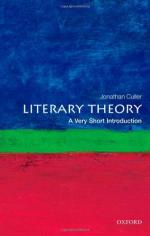
|
| Name: _________________________ | Period: ___________________ |
This test consists of 5 multiple choice questions, 5 short answer questions, and 10 short essay questions.
Multiple Choice Questions
1. In Culler's opinion, to what is rhetoric related?
(a) Poetics.
(b) Blasphemy.
(c) Exaggeration.
(d) Metaphor.
2. What is the literary device that substitutes a part for the whole or vice versa?
(a) Spoonerism.
(b) Doppleganger.
(c) Amplification.
(d) Synecdoche.
3. When a narrator only knows certain things, what is the narration called?
(a) Productive limited.
(b) Third person limited.
(c) Omniscient.
(d) Third person.
4. According to Culler, what is rhetoric?
(a) The study of poetry.
(b) The study of scholarly rules.
(c) The study of language technique.
(d) The study of fictional essays.
5. What great thinker believed plot to be the most significant part of a story?
(a) Beauvoir.
(b) Aristotle.
(c) Voltaire.
(d) Plato.
Short Answer Questions
1. According to Chapter 7, a declarative statement that promises action can be defined as ________________.
2. Who said "the child is father to the man"?
3. What type of poetry allows the reader to listen in on the narrator's thoughts?
4. In relationship to the "I" what does Culler suggest is a constant debate?
5. According to Culler, what do many novels teach about heartache?
Short Essay Questions
1. Who created a portrait of the "modern individual"?
2. What is the function of a narrator within a novel?
3. Who believed that performative language could be somewhat humorous?
4. According to Chapter 5, what is rhetoric?
5. During the Renaissance, what was the definition of rhetoric?
6. According to Culler, how is rhetoric defined today?
7. According to Chapter 7, who developed the idea of performative language?
8. In terms of the "I," what is the product of someone's core?
9. What type of work did Judith Butler pioneer?
10. How does a rhetorical figure use language in poetry?
|
This section contains 461 words (approx. 2 pages at 300 words per page) |

|




